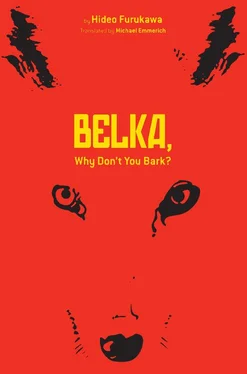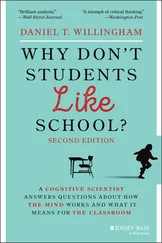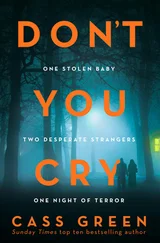“I hear in Tahiti,” your master told you at the end, “they’re going to welcome you as a hero, back after 1,600 years, and you’ll live out the rest of your life as a canine king.”
October 11. You set out from Oahu. A crew of sixteen men and a dog sitting in the double canoe. You were riding the great, wide sea. You, Goodnight, were no longer a dog of the twenty-first parallel north. You were headed south of the equator. But the Polynesian navigator you were all counting on was, it turned out, a fraud who had only joined the crew to get his name in the newspapers. “If worst comes to worst,” he thought, “someone will rescue us with whatever modern equipment they’ve got.” He hadn’t totally mastered the traditional navigation techniques, which were by then being passed down in Polynesia only in secret, to a select few. He was all bluster, just like the researcher. Still, when night fell the sixteen human members of the crew gazed up at the sky. They read the stars. During the day, they watched which way the birds flew. You, Goodnight, didn’t look up at the blue sky; you kept your gaze trained rigidly on the flat horizon. By October 12, you were already growing homesick. You missed the little beagles. Those four puppies you had mothered, and whom you had kept caring for even after they were grown. Your teats tingled. Five pairs of teats that had never lactated.
1975. And the other dog—the male on the twentieth parallel north? Cabron, in Mexico City. He had acquired an alter ego. An alter ego that was simultaneously human and canine. But only when his face was covered; then, and only then, was this man transformed into a dogman. He was thirty years old, a mestizo , and they called him the Hellhound. That, at any rate, was the name he used in the ring. The Hellhound was a luchador .
The Hellhound was active in entertainment wrestling, known as lucha libre, “free fighting,” a sport that had been practiced in Mexico since 1933.
Of course, he donned a dog mask in the ring and fought as a dogman. His special maneuvers were the Dog-Hold and the Dog-Bite, the latter delivered to the top of his opponent’s head. He also did a torpedo kick called the St. Bernard.
The numeral two had a special meaning for the Hellhound. He had two faces, for instance: his outer and his inner face. In the 1970s, there were approximately two thousand luchadores in Mexico, seventy percent of whom wore masks. A certain number of these wrestlers maintained a policy of total secrecy and lived without revealing their true names or places of birth. The Hellhound was one of these. From the time of his debut, he had paid the company that created his mask a huge sum to keep all information regarding his countenance, his unmasked face, under wraps. Two faces: one outer, one inner. The vast majority of luchadores, eighty percent of whom also had other jobs, treated their everyday, unmasked faces as their public faces; the masks were the hidden identities they assumed only in the ring. The Hellhound was different. For him, the masked self, the dogman, was the public self.
The reason for this was obvious: he appeared without his mask, his ordinary face exposed, whenever he had underworld dealings. He had a position in one of the two cartels competing for domination in Mexico. And not just any position—the Hellhound was the boss. He had a special token to prove it. A dog. The dog on the twentieth parallel north. Yes, that’s right, the mongrel Cabron was his. The Hellhound, in other words, was Cabron’s alter ego. The Hellhound looked after Cabron—he owned Cabron, he was owned by Cabron—and so, for precisely that reason, he was acknowledged throughout the underworld, from North America all the way down into Central America, as an official member of La Familia. Texas’s La Familia. The family .
Once again, two. Having an alter ego, being an alter ego.
What’s more, the Hellhound was the second generation in his family to work in this business. He had taken over from his father, who had changed the course of his life. His father had been the first to initiate a relationship with La Familia, and he’d had his own dog. A mongrel the Don had given him. The dog’s father—his seed, that is to say—had been a giant St. Bernard, incredibly brave, fabled throughout the region for having saved no fewer than seven lives. The Hellhound had been born in 1945; his father’s dog joined the household in 1949. Almost as far back as the Hellhound could remember, the dog had been there. The Hellhound had loved to pet the dog, and he would ride him—he had gone in for dog-riding, you might say, not horse-riding—and he would sleep with his head pillowed on the dog’s fluffy, roly-poly stomach, tug on his ears, and pet him some more. The Hellhound had hardly any childhood memories in which this dog did not figure. When he grew older, he used to grapple with the dog, pretending to fight. It was a sort of pseudo- wrestling and also a sort of pseudo-dogfighting. Dogfighting, incidentally, was big in Mexico too. As a boy, the Hellhound had never once managed to get the upper hand on his mongrel opponent. Of course not. The mongrel was a master. On the night of his seventh birthday, frisking around with the dog on the patio, he realized that he would never win. He shed tears of humiliation at his weakness, but at the same time he felt a new respect for the dog welling up within him. From now on, he decided, the dog really would be his master. Master!
Ever since he was a boy, the Hellhound had tended to run with his passions. If he wasn’t as good as the dog, he would learn from the dog. And so his relationship with the mongrel La Familia had given his father deepened; the dog became his family, his teacher, his closest friend. It was during those days that he perfected his killer St. Bernard Kick. The Hellhound had always been an outstandingly physical child, ever since he was born, and he was always landing flying kicks in his classmates’ stomachs at school whenever he flew into a rage. He’d been doing this since almost the first day, even attacking the older tough-guy types.
At the same time, going to school introduced a new worry into his life. Until then, he always assumed his family’s business was perfectly above board, but now it began to dawn on him that the activities they were involved in were criminal. His classmates’ parents weren’t involved in organized crime. What? You mean we’re doing illegal things? Drug dealing and stuff? Killing people? But… isn’t that… isn’t that bad ? The boy began to be tormented by moral qualms. Then it was 1957. The year the dog died. The boy’s family, teacher, and closest friend—gone. The boy was twelve, and it hit him hard. He felt as if a hole had opened up in his heart. He visited the local Catholic church every day to pray for the repose of the dog’s soul. Then one Sunday three months after the dog’s death, something happened. During the sermon. The pastor, as it happened, had spent the previous night with a cousin who had come up to the city from their hometown, and since the two men hadn’t seen each other for four-and-a-half years, the pastor imbibed a bit too much tequila. So he wasn’t doing too well. His voice, as he stood declaiming from the pulpit, was so toneless that most of the congregation started nodding off. The boy, too, felt himself falling under a sort of spell, as if he were succumbing to hypnosis. Only in his case, it wasn’t hypnotism of the You’re getting very, very sleepy type. He was having an actual hallucination. Hearing a mysterious message. First, he heard a voice. A male voice: “Hello? Hello? Hel- low !” It was an adult voice. What? Who is that? The boy glanced around the church, then froze. Up there behind the priest, a little to his right, at the rear of the pulpit, the statue of the crucified Christ was moving its lips. Their gazes met. And BAM , a bolt of spiritual lightning slammed through his body.
Читать дальше












